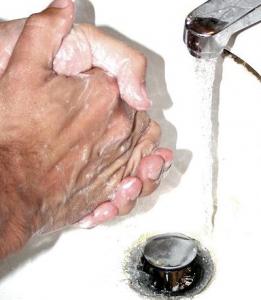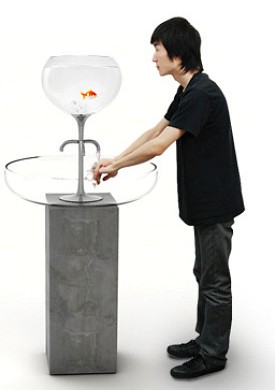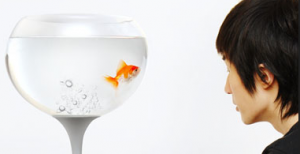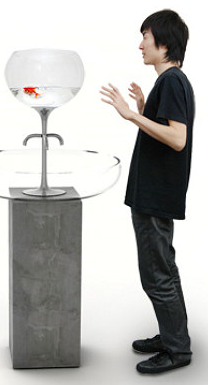
Washing our hands. In the morning. Before and after meals. Usually before bed. Joined with tooth-brushing and a quick gargle. Rinse, spit, smile and gone. It's unconscious--revealing more about your early childhood training than actual hygiene. Lots of water gurgling lazily down the drain.
We also know friends, loved ones who just let the water run as they think about the day, daydream or just beautify. Letting the mirror fog up until they snap back, eyes refocusing as they wipe the mirror clean. Germs. Fear. Beauty. The Madison Avenue trifecta.
Hey, it's such a soothing ritual. It's a lot less expensive than out-call massage, mega-doses of prozac or any of the dozen other serotonin

reuptake inhibitors.
Yan Lu, a young Chinese industrial designer/engineer based in London, has an elegant solution for that ignored water tap. With his coyly named
Poor Little Fishbowl Sink, he created a powerful incentive to conserve water: as soon as you turn the faucet on, the fishbowl's water level begins to fall. The longer you wash your hands, the farther the water level drops. If you're overly fastidious, or worse, afflicted with OCD, the fish's water will drop dangerously low. Sooner or later you'll wise up, shutting the water off--motivated by images of a traumatized goldfish gasping on the bottom of an empty bowl. Conservation by  B.F. Skinner and the Marquis DeSade.
It reminds users that water is a finite resource, even if goldfish aren't. It also connects our mundane actions to a much bigger picture. Hopefully you quickly understand, which for many people is accepted truth, that we're all stewards of the environment. The bedrock
B.F. Skinner and the Marquis DeSade.
It reminds users that water is a finite resource, even if goldfish aren't. It also connects our mundane actions to a much bigger picture. Hopefully you quickly understand, which for many people is accepted truth, that we're all stewards of the environment. The bedrock conservationist's message.
In case you're worried--consumed by images of asphyxiation--the water sources for the fishbowl and the faucet are separate. The fish tank's water level is designed to "appear" to fall until you stop washing your hands. But, in case you're distracted or, blind, the bowl will never drain completely.
Once the water stops running, the fish's water will return to it's original level--ready for the next thoughtless bastard to wash his hands after a hard day of over-eating, drinking, smoking, shopping and possible nefarious activities. Just try to wash that guilt away. Not going to happen. You've fallen prey to a conceptual social experiment that would make Stanley Milgram or the editors of National Lampoon proud. A little emotional cruelty for the sake of the planet.
conservationist's message.
In case you're worried--consumed by images of asphyxiation--the water sources for the fishbowl and the faucet are separate. The fish tank's water level is designed to "appear" to fall until you stop washing your hands. But, in case you're distracted or, blind, the bowl will never drain completely.
Once the water stops running, the fish's water will return to it's original level--ready for the next thoughtless bastard to wash his hands after a hard day of over-eating, drinking, smoking, shopping and possible nefarious activities. Just try to wash that guilt away. Not going to happen. You've fallen prey to a conceptual social experiment that would make Stanley Milgram or the editors of National Lampoon proud. A little emotional cruelty for the sake of the planet.
In Yan Lu's words:
Poor Little Fish basin offers an emotional way to persuade consumers to think about saving water, by making consumption tangible.
Check out YanLu.com for a peek into some fascinating work.
 Washing our hands. In the morning. Before and after meals. Usually before bed. Joined with tooth-brushing and a quick gargle. Rinse, spit, smile and gone. It's unconscious--revealing more about your early childhood training than actual hygiene. Lots of water gurgling lazily down the drain.
We also know friends, loved ones who just let the water run as they think about the day, daydream or just beautify. Letting the mirror fog up until they snap back, eyes refocusing as they wipe the mirror clean. Germs. Fear. Beauty. The Madison Avenue trifecta.
Hey, it's such a soothing ritual. It's a lot less expensive than out-call massage, mega-doses of prozac or any of the dozen other serotonin
Washing our hands. In the morning. Before and after meals. Usually before bed. Joined with tooth-brushing and a quick gargle. Rinse, spit, smile and gone. It's unconscious--revealing more about your early childhood training than actual hygiene. Lots of water gurgling lazily down the drain.
We also know friends, loved ones who just let the water run as they think about the day, daydream or just beautify. Letting the mirror fog up until they snap back, eyes refocusing as they wipe the mirror clean. Germs. Fear. Beauty. The Madison Avenue trifecta.
Hey, it's such a soothing ritual. It's a lot less expensive than out-call massage, mega-doses of prozac or any of the dozen other serotonin reuptake inhibitors.
Yan Lu, a young Chinese industrial designer/engineer based in London, has an elegant solution for that ignored water tap. With his coyly named Poor Little Fishbowl Sink, he created a powerful incentive to conserve water: as soon as you turn the faucet on, the fishbowl's water level begins to fall. The longer you wash your hands, the farther the water level drops. If you're overly fastidious, or worse, afflicted with OCD, the fish's water will drop dangerously low. Sooner or later you'll wise up, shutting the water off--motivated by images of a traumatized goldfish gasping on the bottom of an empty bowl. Conservation by
reuptake inhibitors.
Yan Lu, a young Chinese industrial designer/engineer based in London, has an elegant solution for that ignored water tap. With his coyly named Poor Little Fishbowl Sink, he created a powerful incentive to conserve water: as soon as you turn the faucet on, the fishbowl's water level begins to fall. The longer you wash your hands, the farther the water level drops. If you're overly fastidious, or worse, afflicted with OCD, the fish's water will drop dangerously low. Sooner or later you'll wise up, shutting the water off--motivated by images of a traumatized goldfish gasping on the bottom of an empty bowl. Conservation by  B.F. Skinner and the Marquis DeSade.
It reminds users that water is a finite resource, even if goldfish aren't. It also connects our mundane actions to a much bigger picture. Hopefully you quickly understand, which for many people is accepted truth, that we're all stewards of the environment. The bedrock
B.F. Skinner and the Marquis DeSade.
It reminds users that water is a finite resource, even if goldfish aren't. It also connects our mundane actions to a much bigger picture. Hopefully you quickly understand, which for many people is accepted truth, that we're all stewards of the environment. The bedrock conservationist's message.
In case you're worried--consumed by images of asphyxiation--the water sources for the fishbowl and the faucet are separate. The fish tank's water level is designed to "appear" to fall until you stop washing your hands. But, in case you're distracted or, blind, the bowl will never drain completely.
Once the water stops running, the fish's water will return to it's original level--ready for the next thoughtless bastard to wash his hands after a hard day of over-eating, drinking, smoking, shopping and possible nefarious activities. Just try to wash that guilt away. Not going to happen. You've fallen prey to a conceptual social experiment that would make Stanley Milgram or the editors of National Lampoon proud. A little emotional cruelty for the sake of the planet.
conservationist's message.
In case you're worried--consumed by images of asphyxiation--the water sources for the fishbowl and the faucet are separate. The fish tank's water level is designed to "appear" to fall until you stop washing your hands. But, in case you're distracted or, blind, the bowl will never drain completely.
Once the water stops running, the fish's water will return to it's original level--ready for the next thoughtless bastard to wash his hands after a hard day of over-eating, drinking, smoking, shopping and possible nefarious activities. Just try to wash that guilt away. Not going to happen. You've fallen prey to a conceptual social experiment that would make Stanley Milgram or the editors of National Lampoon proud. A little emotional cruelty for the sake of the planet.








